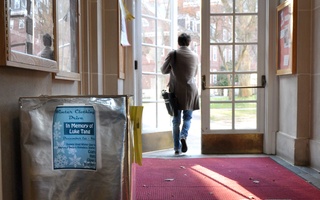Only a week of classes remains before reading period, the College’s semesterly week-long period for students to prepare for final exams. As we’ve previously opined, reading period occupies a special place on the Harvard calendar. It is in many ways a time of contradictions, with festive House formals competing for space on students’ Google Calendars against intense studying. With that in mind, administrators should enact policy changes to ensure that students have the most productive, enjoyable end of semester possible. Conversely, students themselves should take action to maximize what they get out of this time of year.
Most tangibly, administrators should clarify their policies regarding professors’ abilities to assign homework and sections during reading and final period. This time has been specifically set aside to give students an opportunity to focus on their studies, and it is inappropriate for professors to expect students to attend.
We also urge professors to think strategically about when they schedule final projects, papers, and midterms in the build-up to finals season. Science of Living Systems 20: “Psychological Science” traditionally holds its final exam the Monday after Thanksgiving break, making what should be a restful holiday instead a stressful time packed with studying for hundreds of students each fall. Professors should try to find alternatives, such as holding exams immediately before Thanksgiving break or several days after, to enable students to enjoy their vacations. After a long semester—which, unlike most colleges, does not include a fall break—students deserve a few days to unwind and spend time with family.
Students should also tend to their mental health during what can be a stressful and overwhelming time of year. Despite the importance of academic success, mental and physical health should always be students’ first priority. Students should be aware of, and take advantage of, existing mental health resources such as Harvard’s Counseling and Mental Health Services and Room 13, a peer-counseling service.
We also encourage students, particularly freshmen, to avoid falling prey to Harvard’s sometimes toxic academic culture. Harvard students often compete to prove they are more stressed and more studious than their peers. This approach is counterproductive and unhealthy. There is no shame in getting a full night’s sleep or taking a few Netflix breaks - indeed, doing so often yields better results than simply reading through one’s notes repeatedly. When it comes to studying, quality matters more than quantity.
Students should thus consider staying away from the tense, silent study rooms of Widener Library or glorifying all-nighters in Lamont Cafe. (No one gets actual work done there anyway.) Instead, find a comfortable space where you feel productive and relaxed, work with others who are supportive, and create a positive study environment.
Reading period is an excellent time to learn how to balance being a person with being a student. We urge students to carve out time to celebrate the holiday season and be merry with friends. Use this time not only for reading, but also for dancing, eating, and making spirits bright.
This staff editorial solely represents the majority view of The Crimson Editorial Board. It is the product of discussions at regular Editorial Board meetings. In order to ensure the impartiality of our journalism, Crimson editors who choose to opine and vote at these meetings are not involved in the reporting of articles on similar topics.
Read more in Opinion
All That JazzRecommended Articles
-
No Time to ReadAt a December meeting of the Committee on Undergraduate Education, students and faculty members expressed concern about a growing trend
-
Reading PeriodTo the Editors of The Crimson: According to an article by David J. Barron and Matthew A. Saal which appeared
-
 CAMHS and iHope Debut Online Group Mental Health Workshops
CAMHS and iHope Debut Online Group Mental Health Workshops -
Wellness at the the Law School: Promises to Keep and Miles to Go Before We SleepThe mental health crisis facing modern lawyers has been reported so extensively, it barely needs repetition. Yet the causes have been woefully overlooked.
-
 The Administration of Mental Health
The Administration of Mental Health













